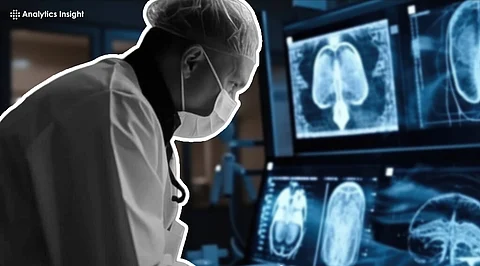

AI is improving early cancer detection through faster and more accurate diagnostic tools.
Personalized treatment plans are being developed using AI to analyze genetic and clinical data.
AI is supporting oncologists with real-time insights, boosting treatment efficiency and patient outcomes.
Artificial intelligence is transforming the healthcare industry by enabling faster and more accurate diagnoses. Researchers believe artificial intelligence will play a key role in predicting patient outcomes across various diseases.
AI isn't just a thing of the future anymore; it's now a real deal in healthcare. By 2025, it's going to seriously change how cancer is treated, making diagnoses faster, helping create better drugs, and setting up personalized treatment plans.
Cancer care is becoming increasingly complex, so AI tools are crucial for doctors and scientists to manage the vast amount of medical information. These tools are changing the way we find, study, and treat cancer, which is excellent news for patients and doctors alike.
The use of AI in cancer care is helping doctors personalize treatments based on individual genetic profiles. Finding cancer early can significantly increase survival rates. Traditional methods of diagnosing cancer, such as imaging and biopsies, can cause delays and errors.
AI tools now support radiologists and pathologists by finding unusual patterns in scans and tissue samples with better speed and accuracy.
Machine learning can analyze numerous medical images to identify the subtle signs of early cancer. Studies have shown that these tools can equal or surpass the accuracy of trained experts in spotting diseases like breast, lung, and skin cancer. This improved speed and accuracy mean that treatment can start sooner, leading to better results.
Also Read: England to Launch Major AI Trial for Faster Breast Cancer Screening
Advancements in artificial intelligence in cancer treatment have led to earlier detection through image analysis and predictive modeling. Cancer's different for each person, so what works for your neighbor might not work for you. That's where AI is beneficial. It can examine your genes, health history, and how you react to medication to suggest treatments that are tailored to you.
These AI helpers utilize information from past patients and studies to identify effective treatment options. AI can assist doctors in choosing the treatment that has the best chance of success, given its use of immunotherapies, radiation, or specific medications. This custom approach can help mitigate adverse reactions and enhance the effectiveness of treatments.
Creating new cancer drugs can take many years and millions of dollars. AI accelerates this process by identifying promising drug compounds more quickly than traditional methods. Instead of manually testing numerous chemicals, AI models demonstrate how molecules might interact with cancer cells, allowing researchers to focus on the most promising options.
By 2025, this technology is expected to have contributed to the development of several new cancer medications. Some treatments developed with AI are already being tested on people, which is excellent news for bringing better treatments to the market. This system also helps drug companies cut down on the time, money, and risks when they're making drugs.
AI's doing some great things in hospitals. Now, doctors can quickly review patient details to pinpoint what’s key, leading to more effective treatment plans in a shorter timeframe. Additionally, AI provides doctors with the latest advice immediately, enabling them to make informed decisions quickly.
AI in oncology is streamlining clinical workflows and reducing the burden on medical professionals. AI-powered chatbots and digital assistants answer common questions, arrange follow-ups, and remotely monitor patient symptoms. This saves healthcare workers time and ensures patients receive steady care without needing to visit the hospital frequently.
Keeping tabs on things is key for cancer survivors to keep cancer away. Wearable devices and apps with AI can track your symptoms, medications, and overall health. They can spot issues early, so doctors get alerts quickly. AI telemedicine could be a significant help in rural areas where it's challenging to access specialists.
AI's getting better at helping with cancer treatment, but there are still some kinks to work out. Patient data privacy is a significant concern, as it involves sensitive health information. Better regulations are needed so that AI tools are used correctly.
More people from the healthcare industry should be trained on using artificial intelligence. The cool part is that hospitals, scientists, and tech experts are joining forces to tackle this. These collaborative projects aim to ensure that AI systems are transparent and reliable, thereby aligning with ethical guidelines and health requirements.
Also Read: Building Smarter Health Systems: A New Era of Medicaid Innovation
Scientists remain hopeful that AI in cancer cure could accelerate drug discovery and enhance treatment precision. Artificial intelligence is not set to replace doctors; instead, it will assist them in their duties.
Artificial intelligence is proving to be a valuable tool in areas such as early cancer detection and patient aftercare. As technology advances, cancer treatment appears to be progressing with the development of improved tools for faster, safer, and more personalized care.
Q1. How is AI helping in early cancer detection?
AI tools analyze medical images to detect early signs of cancer with high speed and accuracy.
Q2. Can AI personalize cancer treatment plans?
Yes, AI suggests treatments based on genetic data and medical history for better patient outcomes.
Q3. Is AI making cancer drug development faster?
AI models identify potential drug compounds quickly, reducing time and cost in drug discovery.
Q4. How does AI support oncologists in hospitals?
AI systems offer real-time suggestions and automate routine tasks to assist medical professionals.
Q5. Can patients be monitored remotely using AI?
AI-powered wearables and apps track symptoms and alert doctors for timely intervention.
